The shift to online learning during the COVID-19 pandemic has opened many people’s eyes to the opportunity to study new subjects online, either as a hobby or to open the door to a new career. In particular, many people have decided to learn to code online.
Two of the biggest names among the various platforms offering the chance to learn to code online are Zenva and Codecademy. These two sites both claim to provide a wide range of courses designed to help you master a variety of coding skills – but which is the better option?
This guide will examine Zenva vs Codecademy in a variety of important categories in order to help you choose the option that’s right for you.
Table of contents
What is Zenva?
Zenva is an online learning platform devoted to coding and related subjects. It has a particular focus on coding and designing games, but also provides a wide range of online programming courses on web development, app development, data science, and more.

Zenva’s courses are geared towards helping you build practical experience alongside your studies. Many of their courses involve creating games, websites, apps, and other projects in order to build an impressive portfolio, helping users to enhance their employability at the same time as learning and gaining experience.
What is Codecademy?
Codecademy offers a wide range of courses in 14 different programming languages, largely focused on beginner-friendly teaching aimed at those who have only just started learning to code.
Similar to Zenva, Codecademy emphasizes portfolio-building exercises, helping users to gain practical experience and build completed projects. Their courses span 15 different subjects including web development, machine learning, and computer science.
Zenva vs Codecademy
Choosing between Zenva and Codecademy can be difficult, as on the surface they appear to offer a similar experience: learning to code through practical exercises that help you to build a portfolio of completed projects. So, to help you choose the right one for you, let’s examine how Zenva and Codecademy compare in greater detail.
Course Quality
One of the most important factors in choosing an online learning platform is the quality of the courses on offer, since this will have a huge effect on your learning experience and how much you’ll ultimately be able to get out of your studies. So how do Zenva and Codecademy compare when it comes to course quality?
Zenva
Zenva’s courses are created and led by a handful of experienced, heavily-vetted instructors. While this means there aren’t many instructors to choose from (and therefore not as many learning styles are catered for), it also means that course quality is consistently high as the contents of each course are created by an experienced industry professional.
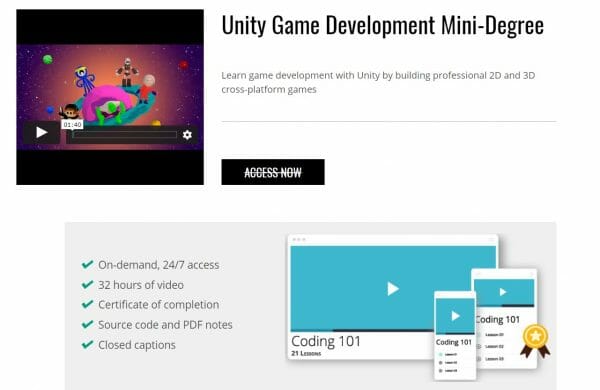
What’s more, Zenva’s production standards are also consistently high, as each course and video is reviewed for quality before posting, ensuring that every course meets a set of quality requirements before it can be published.
Codecademy
Codecademy’s courses are mostly fairly high quality across their various subjects. However, it’s somewhat unclear as to who makes the courses, what their experience level is, and how quality standards are tested and reviewed for each course.
This means that while courses are generally of decent quality across Codecademy, there’s less of a guarantee that all their courses will be held to a baseline of production standards.
Verdict
While Codecademy’s courses are largely of high quality, Zenva’s stricter, more transparent production standards and instructor vetting procedures mean that users can be more confident in high-quality courses across the entire platform. As a result, Zenva wins this category.
Course Variety
The variety of courses offered by an online learning platform is another important consideration. The more course variety there is, the more skills you’ll be able to develop – so let’s examine how Zenva and Codecademy perform when it comes to variety.
Zenva
Zenva offers a decent variety of courses across six main categories: Data Science, Gaming, Mobile Apps, Productivity, Virtual Reality & Augmented Reality, and Web Development. The platform offers nearly 300 courses in total, although by far the main focus on Zenva is their game development courses.
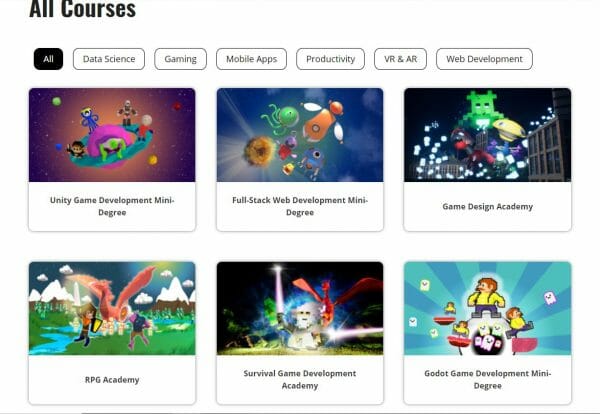
While this focus means there’s slightly less variety in the other categories, if you’re interested in game development then Zenva offers the opportunity to go massively in-depth to gain a wide range of game dev skills. Even if you aren’t specifically interested in game development, these courses can still give you practical experience of working with programming languages such as C++ and HTML5.
Codecademy
Codecademy provides courses in 14 programming languages across 15 subject categories, including web development, data science, game development, and machine learning. This means users have plenty of options in terms of what they want to learn.
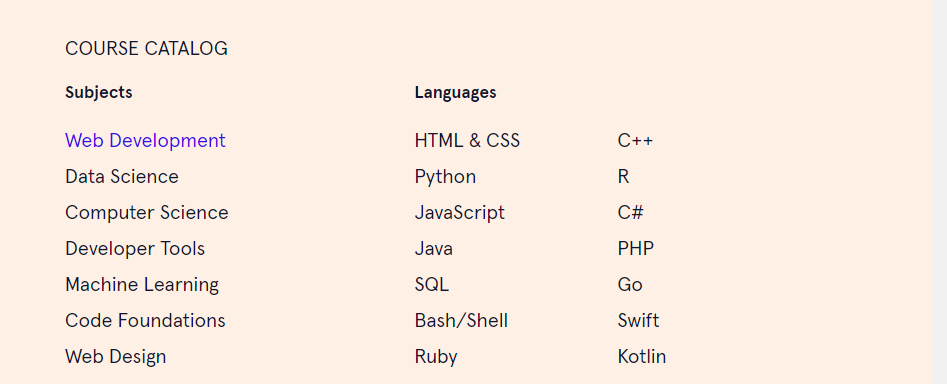
However, Codecademy doesn’t give equal attention to all of its subjects. The major focus lies on its web development courses, whereas other categories like game design only have a handful of courses on offer. It’s therefore a good idea to browse Codecademy’s course catalog to see if the subjects you’re interested in are covered in adequate depth before you sign up.
Verdict
Both Zenva and Codecademy offer good course variety; while Codecademy has a larger library and more subjects overall, the two sites have very different focuses. Because of this, the best site will depend on your personal learning goals – each has specific subjects where there’s a much greater choice of courses, so it depends on what you want to learn about.
Price
Another factor to consider when choosing an online learning platform is how much it will cost you. After all, no matter how good a platform is otherwise, it won’t do you any good if it doesn’t fit your budget. So which offers better value – Zenva or Codecademy?
Zenva
Most individual courses on Zenva cost $50; however, the platform also offers a subscription option that provides access to every course and mini-degree for just $20 per month (or $168 for an entire year, saving you $72 compared to paying monthly).

There are also 12 free courses you can try without paying anything at all. Overall, Zenva offers great value for money.
Codecademy
Codecademy doesn’t allow you to buy access to individual courses; instead, it offers two different subscriptions. The Basic tier is free, and gives access to a selection of courses, interactive lessons, and daily practical exercises. The Pro tier gives full access to all of Codecademy’s courses, a wider range of content and resources, and certificates for completed courses.
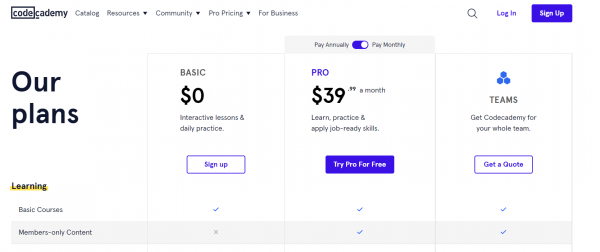
A Pro subscription costs $39.99 for a monthly subscription or $239.88 if you pay for a year upfront (saving $240). College students may also be eligible for the Student Pro subscription – this costs $149.99 for an annual subscription, but doesn’t offer a monthly option.
Verdict
While both platforms offer good value through their subscriptions, Zenva is by far the more affordable platform. Zenva’s monthly plan is half the price of Codecademy’s, and their annual subscription is $71.88 less. The only exception is if you qualify for Codecademy’s student plan – but with no monthly option, the upfront cost of a whole year can be expensive for students.
Course Updates
It’s not enough for a platform to simply upload courses and do nothing else – coding is a fast-moving field, so it’s important that learning platforms work to keep them updated and relevant. With that in mind, let’s see how Zenva and Codecademy handle course updates.
Zenva
Zenva has a comprehensive update policy designed to keep courses as relevant as possible. These updates range from minor additions to lesson summaries and new text lessons for smaller developments, to fully-remade courses that bring old courses in line with modern standards when major developments occur.
What’s more, Zenva makes it easy to report any issues that users find with courses, whether due to outdated information, missing information or files, or video-related issues. As such, the platform guarantees that even if there are any issues that get past their quality control process, they can quickly and easily respond to and fix any issues that users find.
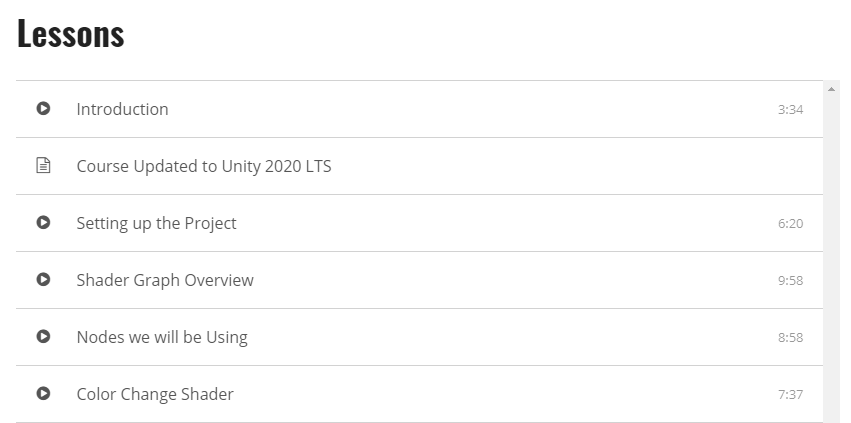
Codecademy
Since Codecademy’s courses often focus on the fundamentals of coding which don’t often change, the site takes a much less proactive approach to updates. While their website has an Updates section that details new and updated courses, there isn’t much information on when and why the platform will update their courses.
It’s also unclear how Codecademy users can report issues with courses that they find. As such, it’s hard to tell whether Codecademy will do much to fix issues with outdated courses if you come across them.
Verdict
Course updates are another area where Zenva takes a lead over Codecademy. While Codecademy’s updates page is evidence that they do update courses on a semi-regular basis, it’s unclear what their actual process is for updates and how users can report issues. Zenva, meanwhile, offers a transparent and effective update policy alongside easy user reporting.
User-Friendliness
It’s not just the courses that matter on a learning platform – the actual structure, interface, and features of the platform are also a big issue. Let’s take a look at how Zenva and Codecademy stack up when it comes to user-friendliness.
Zenva
Zenva offers a whole host of quality-of-life and accessibility features that create a great overall user experience. Every video comes with closed-captions and high-contrast coding backgrounds so that they’re clear and easy to understand; each lesson also includes a text summary for those who would rather read than watch a video.
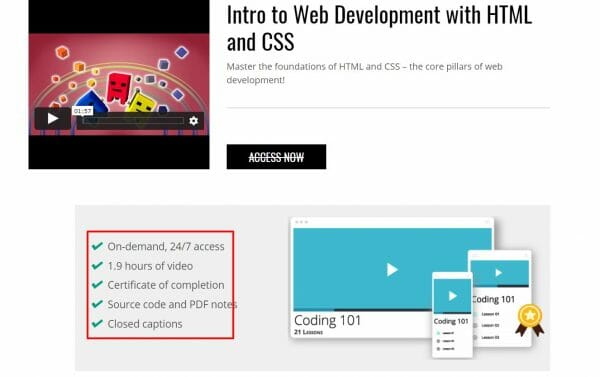
Finally, you can easily locate user reviews on the side menu – making it easy to find out what other users thought of Zenva and decide if the service is for you.
Codecademy
Codecademy offers some decent accessibility measures; in particular, the code editor has a variety of inbuilt options for high contrast, font size, white space, and more. In addition, most of their courses are text-based, allowing learners who can’t use videos as easily to access courses regardless. However, in many instances the videos that are included in courses don’t provide closed captions, reducing their accessibility.
Finally, Codecademy does not provide user reviews or ratings on course pages, making it difficult to gauge how good a course is before starting it.
Verdict
This is another category where Zenva is the clear leader. While Codecademy does have some useful accessibility features in its code editor, the lack of closed captions in videos lets the platform down.
Codecademy’s lack of course reviews makes it harder for learners to find the best courses. Zenva, on the other hand, offers good accessibility options, and user reviews on every course page, giving a much smoother user experience.
Professional Development
For many learners, coding is simply an enjoyable hobby or pastime. To others, though, it’s a vital skill opening up new career pathways – which means it’s important for learning platforms to offer support for learners to advance their skills and careers. So how do Zenva and Codecademy handle professional development?
Zenva
Many of Zenva’s courses revolve around gaining practical experience by working on a variety of different coding projects. Not only does this build valuable practical programming skills, it also means that users can quickly build up an impressive portfolio of completed, real world projects that they can show to employers as examples of their work.
Zenva’s courses also offer certificates of completion that users can add to their resumes, giving employers further proof of the skills they’ve built up through their studies.
Codecademy
Codecademy’s main professional development feature is its provision of Career Paths and Skill Paths, bundles of courses designed to help users master a particular skill or get ready for a specific career. Currently, there are 34 Skill Paths and 8 Career Paths available.

If you’re a Pro subscriber, you can also gain certificates for any courses you complete. In addition, certain courses are designed around building completed projects for your portfolio.
Verdict
Zenva and Codecademy are fairly even on professional development. While Zenva excels in terms of providing impressive completed projects for your portfolio, while Codecademy’s Career and Skill Paths offer slightly more structure to guide users towards specific skill sets for specific career goals.
Final Verdict
While it’s a close call in many categories, in our analysis Zenva ultimately comes out on top. Codecademy does offer a good variety of online courses with fairly consistent quality levels, but ultimately, Zenva beats it in a number of important categories.
For starters, Zenva’s subscription is a much more affordable option – ideal for learners with a more limited budget. Zenva is also much more transparent in terms of its quality control processes and update policies, with an easier reporting system for users to flag up any issues they find with courses.
Perhaps most importantly, Zenva offers a much smoother user experience than Codecademy. Moreover, Zenva makes it much easier to see what other users have to say about different courses, helping you choose the one that’s right for you.
So, if you’re looking to learn to code online, Zenva is definitely a great option in terms of online learning platforms. What’s more, you can easily try it out to see if it’s right for you with the selection of free courses on offer or by signing up. There’s nothing to lose – try it out today!
Did you come across any errors in this tutorial? Please let us know by completing this form and we’ll look into it!

FINAL DAYS: Unlock coding courses in Unity, Godot, Unreal, Python and more.






